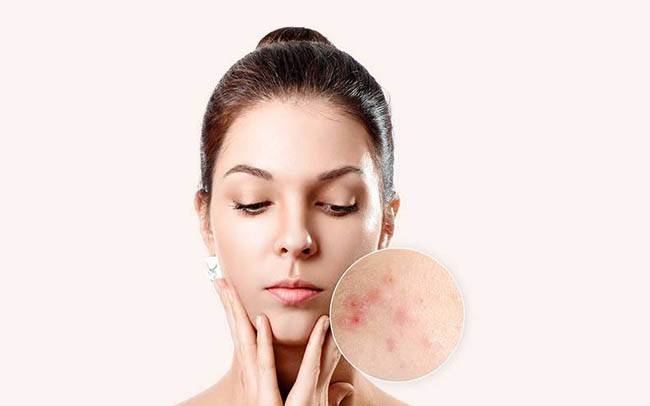Acne typically appears on your face, forehead, chest, upper back and shoulders because these areas of skin have the most oil (sebaceous) glands. Hair follicles are connected to oil glands.
The follicle wall may bulge and produce a whitehead. Or the plug may be open to the surface and darken, causing a blackhead. A blackhead may look like dirt stuck in pores. But actually the pore is congested with bacteria and oil, which turns brown when it's exposed to the air.
Pimples are raised red spots with a white center that develop when blocked hair follicles become inflamed or infected with bacteria. Blockages and inflammation deep inside hair follicles produce cystlike lumps beneath the surface of your skin. Other pores in your skin, which are the openings of the sweat glands, aren't usually involved in acne.
Four main factors cause acne:
- Excess oil (sebum) production
- Hair follicles clogged by oil and dead skin cells
- Bacteria
- Inflammation
• Hormonal changes. Androgens are hormones that increase in boys and girls during puberty and cause the sebaceous glands to enlarge and make more sebum. Hormone changes during midlife, particularly in women, can lead to breakouts too.
• Certain medications. Examples include drugs containing corticosteroids, testosterone or lithium.
• Diet. Studies indicate that consuming certain foods — including carbohydrate-rich foods, such as bread, bagels and chips — may worsen acne. Further study is needed to examine whether people with acne would benefit from following specific dietary restrictions.
• Stress. Stress doesn't cause acne, but if you have acne already, stress may make it worse.
Risk factors for acne include:
• Age. People of all ages can get acne, but it's most common in teenagers.
• Hormonal changes. Such changes are common during puberty or pregnancy.
• Family history. Genetics plays a role in acne. If both of your parents had acne, you're likely to develop it too.
• Greasy or oily substances. You may develop acne where your skin comes into contact with oil or oily lotions and creams.
• Friction or pressure on your skin. This can be caused by items such as telephones, cellphones, helmets, tight collars and backpacks.
Experts still don’t know exactly why some people experience acne and others don’t.
That said, they do recognize a number of risk factors can contribute to or worsen acne, including:
• hormonal changes due to pregnancy or puberty
• polycystic ovarian syndrome (PCOS) and other endocrine conditions
• cigarette smoking
• poor sleep
• stress
• cleansers, creams, moisturizers, and other beauty products with high oil content
• certain medications, including lithium, some types of hormonal birth control, anticonvulsants, and steroids
• a family history of acne.
You have the highest risk of developing acne during puberty. During this time, your body undergoes many hormonal changes. These changes can trigger oil production, leading to an increased risk of acne. Hormonal acne related to puberty usually improves when you reach adulthood, and your breakouts may even stop completely.















